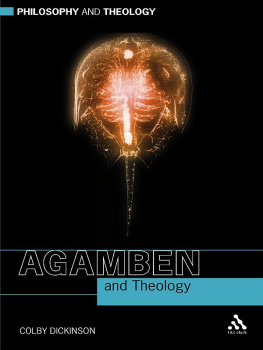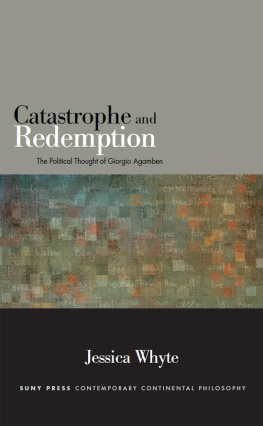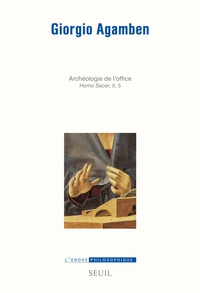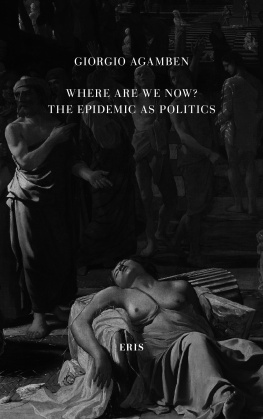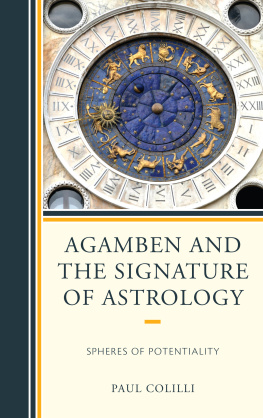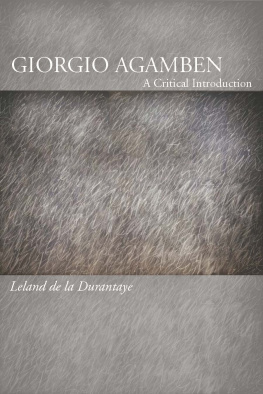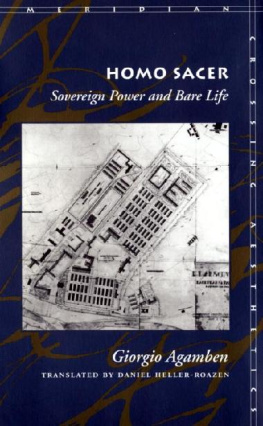Agamben Giorgio - Agamben and Theology
Here you can read online Agamben Giorgio - Agamben and Theology full text of the book (entire story) in english for free. Download pdf and epub, get meaning, cover and reviews about this ebook. City: London, year: 2011, publisher: Continuum International Publishing;T & T Clark, genre: Religion. Description of the work, (preface) as well as reviews are available. Best literature library LitArk.com created for fans of good reading and offers a wide selection of genres:
Romance novel
Science fiction
Adventure
Detective
Science
History
Home and family
Prose
Art
Politics
Computer
Non-fiction
Religion
Business
Children
Humor
Choose a favorite category and find really read worthwhile books. Enjoy immersion in the world of imagination, feel the emotions of the characters or learn something new for yourself, make an fascinating discovery.
- Book:Agamben and Theology
- Author:
- Publisher:Continuum International Publishing;T & T Clark
- Genre:
- Year:2011
- City:London
- Rating:3 / 5
- Favourites:Add to favourites
- Your mark:
- 60
- 1
- 2
- 3
- 4
- 5
Agamben and Theology: summary, description and annotation
We offer to read an annotation, description, summary or preface (depends on what the author of the book "Agamben and Theology" wrote himself). If you haven't found the necessary information about the book — write in the comments, we will try to find it.
Agamben and Theology — read online for free the complete book (whole text) full work
Below is the text of the book, divided by pages. System saving the place of the last page read, allows you to conveniently read the book "Agamben and Theology" online for free, without having to search again every time where you left off. Put a bookmark, and you can go to the page where you finished reading at any time.
Font size:
Interval:
Bookmark:
Agamben and Theology
Other titles in the Philosophy and Theology series include:
Adorno and Theology, Christopher Craig Brittain
Badiou and Theology, Frederiek Depoortere
Derrida and Theology, Steven Shakespeare
Foucault and Theology, Jonathan Tran
Girard and Theology, Michael Kirwan
Habermas and Theology, Maureen Junker-Kenny
Hegel and Theology, Martin J. De Nys
Kant and Theology, Pamela Sue Anderson and Jordan Bell
Kierkegaard and Theology, Murray Rae
Nietzsche and Theology, Craig Hovey
Vattimo and Theology, Thomas G. Guarino
Wittgenstein and Theology, Tim Labron
Zizek and Theology, Adam Kotsko
Colby Dickinson

Published by T&T Clark International
A Continuum Imprint
The Tower Building, 11 York Road, London SE1 7NX
80 Maiden Lane, Suite 704, New York, NY 10038
www.continuumbooks.com
All rights reserved. No part of this publication may be reproduced or transmitted in any form or by any means, electronic or mechanical, including photocopying, recording or any information storage or retrieval system, without permission in writing from the publishers.
Copyright Colby Dickinson, 2011
Colby Dickinson has asserted his right under the Copyright, Designs and Patents Act, 1988, to be identified as the Author of this work.
British Library Cataloguing-in-Publication Data
A catalogue record for this book is available from the British Library
ISBN 13: 978-0-567-22138-4 (hardback)
ISBN 13: 978-0-567-62224-2 (paperback)
Typeset by Newgen Imaging Systems Pvt Ltd, Chennai, India
Printed and bound in India
For Elisabeth & Rowan
I am extremely grateful for the multiple counts of assistance given to my work by Lieven Boeve, Frederiek Depoortere, Joeri Schrijvers, and the various members of the research group Theology in a Postmodern Context within the Faculty of Theology, K.U. Leuven, as they have provided valuable feedback and insight on the research undertaken for this book at multiple stages in its formation. I am also deeply indebted to the K.U. Leuven Research Fund for their generous support which has made my research possible. The many conferences where I have presented various stages of this book were excellent springboards from which to ponder the directions I should take. In particular, I would like to thank the organizers of the following venues for allowing me to participate and to share the research I was then conducting: Towards a Philosophy of Life held at Liverpool Hope University, England (2009), Real Objects or Material Subjects? held at the University of Dundee, Scotland (2010), the Catholic Theological Society of Americas annual conference (2010), and the Colloquium on Violence and Religion held at Notre Dame University (2010). In addition, I would also like to acknowledge those who have given their time by looking over earlier versions of this book and offering their comments and suggestions, including Ken Surin, Peter Langford, and Elisabeth Bayley, as well as Adam Kotsko, for his assistance with translational queries.
| B | Bartleby, la formula della creazione (con Gilles Deleuze) |
| CC | The Coming Community |
| EP | The End of the Poem: Studies in Poetics |
| HS | Homo Sacer: Sovereign Power and Bare Life |
| IH | Infancy and History: On the Destruction of Experience |
| IP | The Idea of Prose |
| LD | Language and Death: The Place of Negativity |
| MC | The Man without Content |
| ME | Means without Ends: Notes on Politics |
| N | Nudits |
| O | The Open: Man and Animal |
| P | Potentialities: Collected Essays in Philosophy |
| PR | Profanations |
| RA | Remnants of Auschwitz: The Witness and the Archive, Homo sacer III |
| RG | Le Rgne et la gloire. Pour une gnalogie thologique de lconomie et du gouvernement. Homo Sacer II, 2 |
| S | Stanzas: Word and Phantasm in Western Culture |
| SA | The Signature of All Things: On Method |
| SE | State of Exception, Homo sacer II, 1 |
| SL | Le sacrement du langage. Archologie du serment. Homo sacer II, 3 |
| TR | The Time That Remains: A Commentary on the Letter to the Romans |
| WA | What is an Apparatus? and Other Essays |
In a staged dialogue with Juliane Schiffers for the journal Law Critique, Alice Lagaay speaks about the experience of reading Giorgio Agamben through a childhood image which seems, for her, to evoke a similar existential dissolution of the will as she encounters it in reading his work. As she describes it, and as it bears repeating,
[i]ts a sudden, physical encounter with a sense of the profound foreignness of the world (or the foreignness of my own being-in-the-world). In this state, which even as a child would sometimes overcome me, the activities of every day life are suddenly put on hold, making space for the perception of a state of bare existence, whatever that may be, yes something like neutral, meaningless, material existence. This state corresponds to a very intimate, indeed quite unique (and at the same time uncannily general) and perhaps even (despite this attempt here) quite incommunicable feeling. It is on the one hand an individual, personal experience, in the sense that it has to do with a sensing of my own being. Yet on the other hand, there is something about it that is clearly more impersonal, more general than perhaps any other experience Ive ever had, for, when under the grips of this mystery, it feels as if all that is personal and individual in me were suddenly to dissolve, as if my very being were about to merge with the concrete walls of the room that my fingers may just be brushing.
At which point an unnamed interlocutor (simply designated as voice off) asks [w]hat sense can it possibly make to talk about such a personal and indescribable event in an academic context such as this? Where will it lead? Her dialogue partner seemingly responds for her by pointing out that the recounting of such an experience, no matter how indescribable, points to the limits of language, as well as of academic discourse. That is, the experience which has just been recounted is one which seems to indicate a place where the typical divisions between the individual and the universal are dissolved. This, she indicates, is what Agambens work is all about.
What this event signals, no less, is the dissolution of the boundaries typical of thought, not to mention academia in general. Schiffers can therefore state that what an event such as this directs our attention to is not the pros and cons of an argument; rather, thought is turned toward itself. It becomes self-referential and thus, to a certain extent, without distance to itself. A strange state indeed.
Considering that his work in general attempts to defy those reductionistic representations or labels we so often apply to people in the academic world, and that the experience of reading Agamben apparently lends itself to dissolving those traditional boundaries anyway, it perhaps would be in bad taste to begin this study of Giorgio Agamben and his relation to theology with a few quick gestures toward whichever fields of inquiry would seem to be most receptive to his writings. Political theory, philosophy, law, theology, poetry, literary studies, linguistics, philology, history, cultural studies, film and visual arts, as well as a host of others to be sure, could all lay claim to his work, which, for its part, seems content to crisscross through each and every one of these disciplinary boundaries. But, just as assuredly, none of these disciplines could be said to typify his writing which seems to address the heart of each theoretical realm and yet transcend the very boundaries of every one. And, as we will soon see, crossing over borders and boundaries is precisely what he has foremost in mind.
Next pageFont size:
Interval:
Bookmark:
Similar books «Agamben and Theology»
Look at similar books to Agamben and Theology. We have selected literature similar in name and meaning in the hope of providing readers with more options to find new, interesting, not yet read works.
Discussion, reviews of the book Agamben and Theology and just readers' own opinions. Leave your comments, write what you think about the work, its meaning or the main characters. Specify what exactly you liked and what you didn't like, and why you think so.

